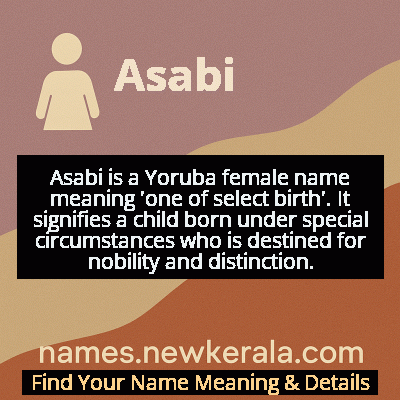Asabi Name Meaning & Details
Origin, Popularity, Numerology Analysis & Name Meaning of Asabi
Discover the origin, meaning, and cultural significance of the name ASABI. Delve into its historical roots and explore the lasting impact it has had on communities and traditions.
Name
Asabi
Gender
Female
Origin
African
Lucky Number
5
Meaning of the Name - Asabi
Asabi is a Yoruba female name meaning 'one of select birth'. It signifies a child born under special circumstances who is destined for nobility and distinction.
Asabi - Complete Numerology Analysis
Your Numerology Number
Based on Pythagorean Numerology System
Ruling Planet
Mercury
Positive Nature
Adventurous, dynamic, curious, and social.
Negative Traits
Restless, impatient, inconsistent, prone to indulgence.
Lucky Colours
Green, white.
Lucky Days
Wednesday.
Lucky Stones
Emerald.
Harmony Numbers
1, 3, 9.
Best Suited Professions
Sales, marketing, travel, entertainment.
What People Like About You
Versatility, charisma, adventurous spirit.
Famous People Named Asabi
Asabi Folashade
Traditional Weaver
Renowned master of Aso Oke textile artistry, preserving Yoruba weaving traditions
Asabi Adeola
Educator
Founded multiple literacy programs for rural Yoruba communities
Asabi Ogunlana
Cultural Ambassador
Promotes Yoruba naming ceremonies and cultural practices globally
Name Variations & International Equivalents
Click on blue names to explore their detailed meanings. Gray names with will be available soon.
Cultural & Historical Significance
The selection of Asabi indicates the family's recognition of the child's unique spiritual journey and their hopes for her to embody nobility, resilience, and distinction throughout her life. Historically, such names were carefully chosen by elders and traditional naming priests (Babalawo) who would consider the circumstances of birth, family history, and spiritual signs. The name serves as both a blessing and a responsibility, reminding the bearer of their special place in the family and community lineage.
Extended Personality Analysis
Women named Asabi are often perceived as possessing innate leadership qualities, confidence, and a strong sense of self-worth that aligns with their name's meaning of 'select birth'. They typically exhibit natural grace under pressure and demonstrate resilience in challenging situations, characteristics that reflect their name's association with special destiny. Many Asabis develop a deep sense of cultural pride and responsibility, often becoming custodians of tradition while simultaneously embracing progressive values.
Their personality often blends traditional wisdom with modern insight, making them effective bridges between generations and cultures. Community members frequently describe Asabis as having a calming presence and natural authority that commands respect without being authoritarian. They tend to be deeply family-oriented while maintaining strong individual identities, and often excel in roles that require both emotional intelligence and strategic thinking. The name's cultural weight often inspires them to pursue excellence in their chosen fields while maintaining strong connections to their heritage.
Modern Usage & Popularity
In contemporary times, Asabi maintains its traditional significance while adapting to modern naming trends. The name has seen steady usage among Yoruba communities in Nigeria and the diaspora, particularly among families seeking to preserve cultural heritage. While not among the most common Yoruba names, it enjoys consistent popularity among educated, urban families who value its deep cultural meaning. Recent years have shown a slight increase in usage as part of the broader African cultural renaissance movement, with parents choosing names that reflect pride in African identity and values. The name appears more frequently in professional contexts as cultural barriers diminish, though it remains predominantly used within Yoruba and broader Nigerian communities rather than achieving widespread international adoption.
Symbolic & Spiritual Meanings
Symbolically, Asabi represents the concept of chosenness and divine selection, embodying the idea that some individuals carry special purpose or destiny. The name serves as a metaphor for resilience and excellence, suggesting that its bearer is meant to overcome challenges and achieve distinction. In broader symbolic terms, it represents the intersection of ancestral blessings with personal potential, the connection between heritage and individual greatness, and the belief that certain births carry collective significance beyond the immediate family. The name symbolizes the Yoruba philosophical concept that every individual has a unique role in the cosmic order, with Asabi specifically representing those destined to embody and advance cultural values and traditions.

